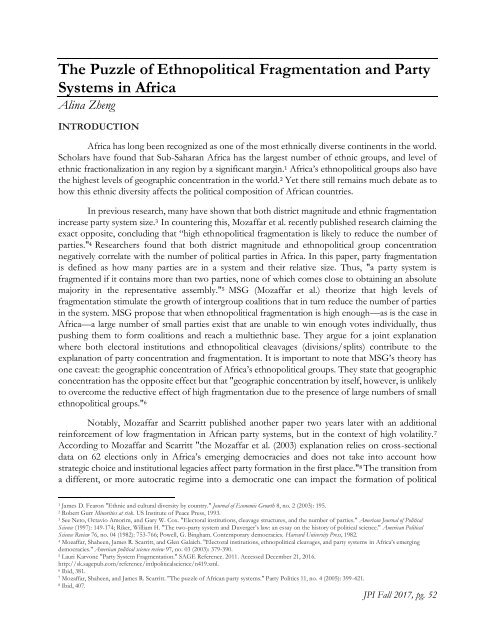Fall 2017 JPI
Create successful ePaper yourself
Turn your PDF publications into a flip-book with our unique Google optimized e-Paper software.
The Puzzle of Ethnopolitical Fragmentation and Party<br />
Systems in Africa<br />
Alina Zheng<br />
INTRODUCTION<br />
Africa has long been recognized as one of the most ethnically diverse continents in the world.<br />
Scholars have found that Sub-Saharan Africa has the largest number of ethnic groups, and level of<br />
ethnic fractionalization in any region by a significant margin. 1 Africa’s ethnopolitical groups also have<br />
the highest levels of geographic concentration in the world. 2 Yet there still remains much debate as to<br />
how this ethnic diversity affects the political composition of African countries.<br />
In previous research, many have shown that both district magnitude and ethnic fragmentation<br />
increase party system size. 3 In countering this, Mozaffar et al. recently published research claiming the<br />
exact opposite, concluding that “high ethnopolitical fragmentation is likely to reduce the number of<br />
parties." 4 Researchers found that both district magnitude and ethnopolitical group concentration<br />
negatively correlate with the number of political parties in Africa. In this paper, party fragmentation<br />
is defined as how many parties are in a system and their relative size. Thus, "a party system is<br />
fragmented if it contains more than two parties, none of which comes close to obtaining an absolute<br />
majority in the representative assembly." 5 MSG (Mozaffar et al.) theorize that high levels of<br />
fragmentation stimulate the growth of intergroup coalitions that in turn reduce the number of parties<br />
in the system. MSG propose that when ethnopolitical fragmentation is high enough—as is the case in<br />
Africa—a large number of small parties exist that are unable to win enough votes individually, thus<br />
pushing them to form coalitions and reach a multiethnic base. They argue for a joint explanation<br />
where both electoral institutions and ethnopolitical cleavages (divisions/splits) contribute to the<br />
explanation of party concentration and fragmentation. It is important to note that MSG’s theory has<br />
one caveat: the geographic concentration of Africa’s ethnopolitical groups. They state that geographic<br />
concentration has the opposite effect but that "geographic concentration by itself, however, is unlikely<br />
to overcome the reductive effect of high fragmentation due to the presence of large numbers of small<br />
ethnopolitical groups." 6<br />
Notably, Mozaffar and Scarritt published another paper two years later with an additional<br />
reinforcement of low fragmentation in African party systems, but in the context of high volatility. 7<br />
According to Mozaffar and Scarritt "the Mozaffar et al. (2003) explanation relies on cross-sectional<br />
data on 62 elections only in Africa’s emerging democracies and does not take into account how<br />
strategic choice and institutional legacies affect party formation in the first place." 8 The transition from<br />
a different, or more autocratic regime into a democratic one can impact the formation of political<br />
1 James D. Fearon "Ethnic and cultural diversity by country." Journal of Economic Growth 8, no. 2 (2003): 195.<br />
2 Robert Gurr Minorities at risk. US Institute of Peace Press, 1993.<br />
3 See Neto, Octavio Amorim, and Gary W. Cox. "Electoral institutions, cleavage structures, and the number of parties." American Journal of Political<br />
Science (1997): 149-174; Riker, William H. "The two-party system and Duverger’s law: an essay on the history of political science." American Political<br />
Science Review 76, no. 04 (1982): 753-766; Powell, G. Bingham. Contemporary democracies. Harvard University Press, 1982.<br />
4 Mozaffar, Shaheen, James R. Scarritt, and Glen Galaich. "Electoral institutions, ethnopolitical cleavages, and party systems in Africa’s emerging<br />
democracies." American political science review 97, no. 03 (2003): 379-390.<br />
5 Lauri Karvone "Party System Fragmentation." SAGE Reference. 2011. Accessed December 21, 2016.<br />
http://sk.sagepub.com/reference/intlpoliticalscience/n419.xml.<br />
6 Ibid, 381.<br />
7 Mozaffar, Shaheen, and James R. Scarritt. "The puzzle of African party systems." Party Politics 11, no. 4 (2005): 399-421.<br />
8 Ibid, 407.<br />
<strong>JPI</strong> <strong>Fall</strong> <strong>2017</strong>, pg. 52
















